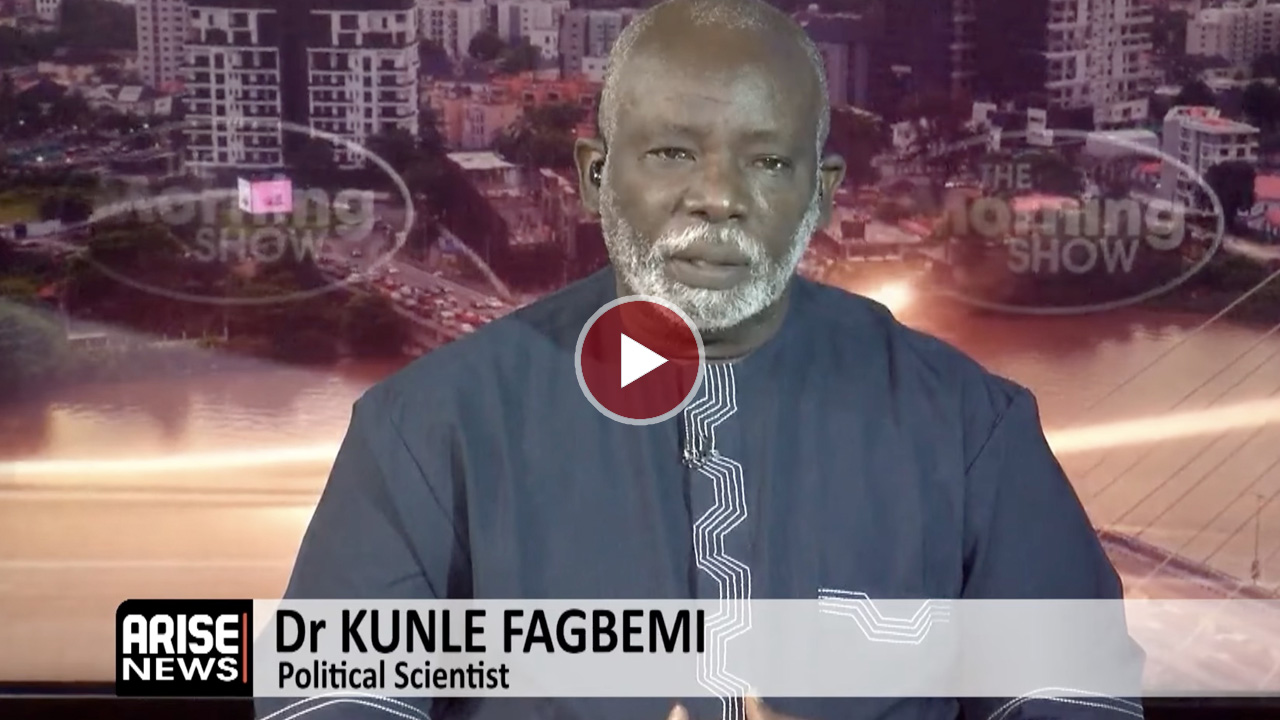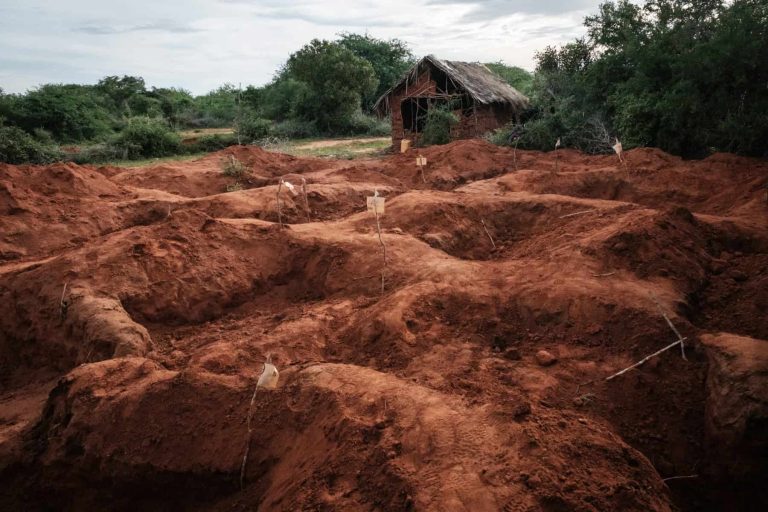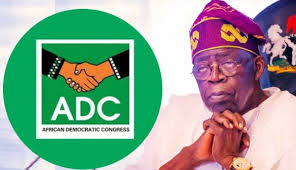

Political Scientist,Dr. Kunle Fagbemi said Nigeria’s escalating security crisis is the direct consequence of successive administrations refusing to obey constitutional structures guiding national security operations.
In an interview with ARISE NEWS on Monday, Fagbemi said Nigeria has functioned outside its proper security architecture for nearly a decade, undermining every effort to curb terrorism, banditry, kidnapping, communal violence, and cross-border threats.
“This is the most important reason why we are going through this cycle of national security breaches again and again. Successive administrations, with the exception of very few, are unwilling to follow to the letter their own manifesto or obey the constitution the way they should.”
Fagbemi argued that President Bola Tinubu’s handling of national security has not aligned with the commitments outlined in his own Renewed Hope Agenda. “The incumbent administration campaigned on the notion of a renewed agenda, and on the fifth page of that renewed agenda manifesto of President Bula Hamet, it is written that the national security of the Nigerian state, which happens to be the first cardinal important trajectory for his manifesto, says that national security is considered to be the bedrock of a prosperous and democratic society. To this end, the fundamental responsibility of government is to protect the lives and property of its citizens. We will mobilise the totality of our national security, military, and law enforcement assets to protect all Nigerians from danger and from the fear of danger. We will expand and improve upon the use of technology, enhance recruitment of personnel, and bolster existing agencies and systems to achieve this fundamental goal. Our administration will be committed to permanently securing the safety, freedom, and prosperity of all Nigerians.”
According to him, those commitments have remained largely unimplemented after more than two years in office. “But unfortunately, today is the 910th day in office as president commander-in-chief. And today being the 910th day, we can see that the constitution has not been obeyed to the letter, which is the bane of most administrations.”
Fagbemi strongly criticised the meeting recently held at the State House, which the Presidency described as a national security meeting. “Yesterday, a meeting held at the State House complex in the office of the president commander-in-chief. Painfully, this meeting was reported that the president was meeting with a group of people called service chiefs. Unfortunately, by the virtues of the provisions of the constitution, a president does not meet with service chiefs. The president commander-in-chief of the Nigerian armed forces only meets in security council provided for by the constitution and or the defence council of which service chiefs are members. Yesterday, at best, what we can describe held yesterday was a communication strategy meeting. Because when you look at those who were in attendance, you had bio or none who got the special advisor on information. You had some the diary. And then you have a minister who was in charge of information and strategy. And then you have the incumbent minister of information and orientation. It therefore means that yesterday was not a proper meeting that had to do with security matters.”
He explained that the constitution mandates the presence of specific statutory members including the Minister of Interior, Minister of Defence, Minister of Foreign Affairs, Inspector General of Police, Chief of Defence Staff, National Security Adviser, and the Vice President to legally classify any gathering as a security meeting. “Because if they had a meeting that had to do with security matters, it should have been held at security council. And permit me to read from the constitution the case section of the third schedule that talks about the national security. The membership of the national security council shall comprise the following members: The president who shall be the chairman. The vice president who shall be the deputy chairman. The chief of defence staff. The minister of government of the federation charged with the responsibility for internal affairs as the minister of interior. The minister of the government of the federation that is charged with the responsibility for defence. The minister of the government of the federation charged with the responsibility for foreign affairs. The national security advisor. The inspector general of police. And such other persons as the president may in his discretion appoint.”
He emphasised that these officials were either absent or not properly represented, stating that the gathering resembled a media strategy briefing rather than the country’s highest security decision-making platform, further illustrating the institutional breakdown in Nigeria’s approach to national security. “So we are where we are today in terms of the security breaches and challenges that we’re having primarily because the people that have been occupying offices in the last 10 years in particular, 2015 to date, have not been sincere to obey the constitution.”
Fagbemi said the government’s approach to policing remains dangerously outdated and fragmented, beginning with poor documentation of crimes and the failure of police commands to escalate threats promptly from the community level. “The most important is we need to now start talking about national security and defence management service delivery. To appreciate this, I will just talk about policing. Policing is a triad. You have statutory police component of it, and then you have the informal neighbourhood watch policing, and then you have the quasi, and that is where you have the paramilitary and the national security and civil defence, and all those components of private security outfits. It is time for us to begin to interrogate and integrate how we can bring a seamless cooperation and as such ensure that the provisions of the national security strategy are followed to the provisions of the Nigerian police act is obeyed. The unfortunate aspect of it is that many of these are not properly documented, and that is why we can have government officials trying to discourage people from saying this is a demography that was most affected. It is not whether a demography was it. It is the fact that you can immediately see that these individuals that were killed were victims of crimes and criminalities.”
He warned that deploying ministers and service chiefs to crisis zones would not fix structural defects within the policing system, noting that effective security begins with divisional police officers reporting accurately, area commands escalating threats, and state commands coordinating with federal authorities using established protocols. “The unfortunate aspect of it is that many of these are not properly documented, and that is why we can have government officials trying to discourage people from saying this is a demography that was most affected. It is not whether a demography was it. It is the fact that you can immediately see that these individuals that were killed were victims of crimes and criminalities.”
According to him, unless the government reforms its recruitment system and conducts thorough background checks, Nigeria risks ending up with a police force infiltrated by individuals with criminal tendencies, making national security harder to reclaim. “And the geopolitics that Vilma was wanting me to talk about, when you now start looking at it from the angle of the global terror networking and the dynamics of extremism that is prevalent, and we are now having ISIS, ISWA, you are having all this Boko Haram, you begin to see that we are going to end up, if care is not taken, recruiting some of these characters that have criminal tendencies into the police. Should we do that, then we can as well talk about the fact that there was a country like Chinua Achebe wrote in a book.”
He stressed that these documents contain actionable plans that have been neglected by leaders who prefer emergency reactions to long-term institutional reforms. “The incumbent administration, unfortunately, is not allowing itself to be governed properly and advised in such a way that they will manage these issues. Hopefully, I am hoping that after this kind of intervention, we will have a recalibration and not a situation where the information managers of the presidency and the ministry of information are the ones that will be gathered.”
Fagbemi added that constitutional gaps and institutional negligence are the primary reasons insecurity persists. “ The country’s security response remains disjointed because those responsible for implementing security frameworks have failed to do so.”
On Nigeria’s role in global and regional security engagements, Fagbemi warned that sidelining key actors, especially the Director-General of the National Intelligence Agency (NIA), could seriously compromise the country’s geopolitical interests. “The Director General of the National Intelligence Agency is not included. Ideally, that ought to have been. And you are not supposed to have an advisor to the President Commander-in-Chief leading a delegation that is comprised of a minister. At best, the Minister of State for Foreign Affairs that is on that delegation should actually have led that delegation. So when you have a government or a system that is operating in aeration of the constitutional and legal and policy frameworks, we’ll always have these issues.”
He cited Nigeria’s legal obligations under ECOWAS, the African Union, the United Nations, and various Lake Chad Basin security agreements, stressing that the government must present a unified and properly constituted national security delegation to maintain credibility. “Nigeria belongs to ECOWAS, the African Union, United Nations, Commonwealth, Lake Chad Basin. And each of these entities have what is called a peace and security architecture that are very detailed and important. And there are some protocols and principles, one of which is a responsibility to protect, which allows the global system, the international community, to say, you need to act based on your own constitution for the security and safety of your people. You must not allow mass criminal atrocities to be committed without being interrogated.”
Erizia Rubyjeana



